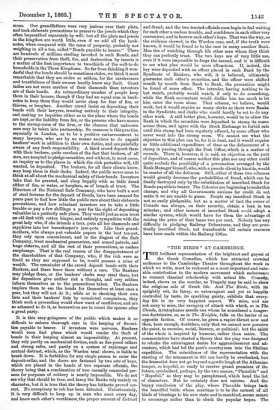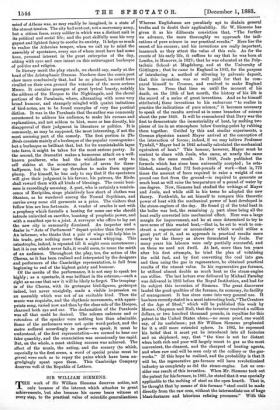"THE BIRDS" AT CAMBRIDGE.
THE brilliant representation of the brightest and gayest of the Greek Comedies, which has attracted crowded audiences to the Cambridge Theatre throughout the week in which we write, must be reckoned as a most important and vain, able contribution to the modern movement which endeavours to connect classical scholarship with actual life. Comedy-, indeed, shows us the secular, as Tragedy may be said to show the religious side of Greek life. And The Birds, with its sprightly wit, its fancy, so extravagant and yet so happily controlled by taste, its sparkling gaiety, exhibits that every- day life in its very happiest aspect. We miss, and are not sorry to miss, the savagery of attack with which, as in The Clouds, Aristophanes assails one whom he considered a danger- ous doctrinaire, or, as in The Knights, falls on the leader of an opposite faction. Of course, he gives a rapier-thrust now and then, keen enough, doubtless, only that we cannot now perceive the point, to enemies, social, literary, or political; but the spirit of the whole is inspired by humour, rather than satire. The commentators have started a theory that the play was designed to rebuke the extravagant desire for aggrandisement and ad- venture, which had led the poet's countrymen into the Sicilian expedition. The coincidence of the representation with the starting of the armament in 415 can hardly be overlooked, but the dramatist does not go beyond a gentle laugh at the Athenian temper, so hopeful, so ready to receive grand promises of the future, symbolised, perhaps, by the two names, "Plausible" and "Hopeful," as they may be paraphrased, which head the list of characters. But he certainly does not satirise. And the happy conclusion of the play, where Plausible brings back the beautiful bride whose marriage is to be the earnest of all kinds of blessings to his new state and to mankind, seems meant to encourage rather than to check the popular hopes. The
mind of Athens was, as may readily be imagined, in a state of the utmost tension. The city had sent out, not a mercenary army, but a citizen force, every soldier in which was a distinct unit in its political and social life; and the poet skilfully uses his very gayest and lightest fancy to soothe its anxiety. It helps us much to realise the Athenian temper, when we call up to mind the assembly of spectators, every one of whom must have had some keen, personal interest in the great enterprise of the day, sitting with eyes and ears intent on this extravagant burlesque of politics and religion.
In literary merit the play stands, we should say, easily at the head of the Aristophanic Dramas. Nowhere does the comic poet show more conclusively that, had he so pleased, he could have rivalled on their own ground the votaries of the more serious Muses. It contains passages of great lyrical beauty, notably the address of the Hoopoe to the Nightingale, and the choral portions of the Parabasis, where, alternating with some very broad humour, and strangely mingled with quaint imitations of bird-notes, are to be found examples of very fine poetical diction. It was in the Parabasis that the author was commonly accustomed to address his audience, to make his excuses and explanations, and not seldom to hint, more or less directly, his disapproval of their judgment in literature or politics. It is commonly, as may be supposed, the most interesting, if not the most amusing part of the comedy. The first portion in The Birds consists mainly of a burlesque of the popular cosmogonies ; but a burlesque so brilliant that, but for its unmistakable lapse into farce, it might be taken for the most serious poetry. In the second, the dramatist makes a humorous attack on a well- known poulterer, who had the wickedness not only to sell siskins at the monstrous price of seven for three- halfpence, but to blow up thrushes to make them appear plump. For himself, he has only to say that if the spectators will give their judgment in his favour, his patrons, the Birds, shall reward them with all kinds of blessings. The comic busi- ness is exceedingly amusing. A poet, who is certainly a reminis- cence of Euripides, sings plaintively how short of clothes was Straton, as he wandered among the Nomad Scythians, and carries away some old garments as a prize. The visitors that follow him are less fortunate. A vendor of oracles is met with a prophecy which foretells a beating for some one who should intrude uninvited on sacrifice, boasting of prophetic power, and with a manifest eye to a joint. A surveyor who offers to lay out the new city is summarily dismissed. An inspector and a dealer in "Acts of Parliament" depart quicker than they came. An informer, who thinks that a pair of wings will help him in his trade, gets nothing more than a sound whipping. This catastrophe, indeed, is repeated till it might seem monotonous ; but it is one which never fails, it would seem, to rouse the mirth of an audience. Throughout the play, too, the action of the Chorus, as it has been realised and interpreted by the designers and performers of the Cambridge representation, is full from beginning to end of the highest gaiety and humour.
Of the merits of the performance, it is not easy to speak too highly ; as a spectacle, it was brilliant in the extreme,—such a sight as no one that saw it will be likely to forget. The trooping- in of the Chorus, with its grotesque bird-figures, grotesque indeed, but never unsightly, made a visible impression on an assembly which was not of an excitable kind. Then the music was exquisite, and the rhythmic movements, with appro • priate song, varied now and then by the clear solo of the Hoopoe, charmed both eye and ear. The declamation of the Parabasis was all that could be desired. The solemn cadences and os rotundunt of the speaker were nothing less than admirable. Some of the performers were not quite word-perfect, and the metre suffered accordingly in parts—we speak, it must be understood, of the first representation—we seemed to hear one false quantity, and the enunciation was occasionally too rapid. But, on the whole, a most striking success was achieved. The effect of the music, the acting, and the scenery (to which, especially to the first scene, a word of special praise must be given) were such as to repay the pains which have been un- grudgingly spent upon them. This Cambridge Company deserves well of the Republic of Letters.







































 Previous page
Previous page